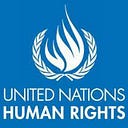Men and boys crucial in fight to prevent violence against women
Recently the UN Human Rights Office held a conversation with four experts on how to get men and boys participating preventing violence against women. The discussion centered on prevention, engagement and why they are necessary for the fight.
Lana Wells is a Brenda Strafford Chair in the Prevention of Domestic Violence at the University of Calgary in Canada. She is currently leading Shift:The Project to End Domestic Violence.
UN Human Rights Office: Why do you think men and boys are an important part in solving the problem of violence against women?
“I believe that men and boys are part of the solution. When you look at the history of violence against women in the last 30–40 years, most of it has been designed around women being victims and men being perpetrators. We think that the narrative needs to change, because men are more than that, and we need them engaged in order to stop violence against women.
“We know that men and boys have a lot of privilege, a lot of influence, and so we need them both promoting and building gender equality, but also promoting healthy relationships and rebuilding what it means to be a man.”
Abhijit Das is the co-chair of MenEngage Alliance and the found of Men’s Action for Stopping Violence against women in India. For the last 20 years he has worked with men in India on changing attitudes toward women.
UN Human Rights Office: What difference have you seen in men and boys whom you have engaged in this work?
“We started out with the belief that most men do not agree with gender discrimination, but mostly keep silent and through their silence endorse this gender discrimination. But, [I found] if that silent majority starts to become a more visible and vocal majority for gender equality, then those people who were earlier visible discriminators become quiet. You slowly establish an alternative social norm.
There are benefits in numbers. One single man gets overwhelmed with social opposition. But when you have a group of men who say we believe differently, we act differently and we will challenge your discriminatory acts, then there is change.”
Anthony Keedi is the Masculinities Technical Adviser for ABAAD Resource Centre for Gender Equality in Lebanon. He became involved with the issue after taking a deep dive into his own experiences with and participation in violence.
UN Human Rights Office: There is some idea that violence is natural to men. How does that square with engaging men and boys in women’s empowerment?
“When we start questioning the concept of what it means to be a man, a human being, particularly in conflict contexts, we see that violence is not inherent in men, it is learnt. Thus changing men into agents of change, peace and gender equality is possible through transformational change. The goal is to become a real human being, because men’s values go far beyond just to provide for their families or just showing strength, it can be in giving care, it should be in parenting and showing every facet of human being life. Thus eliminating the excuse of some men that they have to protect women, and therefore (prevent them) from promoting women’s independence.”
“Every single time I see young men, and young women too, because they too have such attitudes — start to question what they know, and realize their rigid roles don’t make sense, that is a change. Every time you see that turn into action, that is a change. Every time they slip or relapse [back into old habits] and then think about it and take reparative actions, that is a change. It is a transformative process. The only thing holding it back from being a wave, rather than a ripple is the support and opportunities.”
Francis Oko Armah is a youth activist, who works for Curious Minds in Ghana. The 25-year-old says he has been fighting for women’s empowers since he was a teen and heard young people talking about human rights on his local radio station.
UN Human Rights Office: What can men do to become better allies to women and combat the idea that a gain for women means a loss for men?
“Over the centuries, people have taught that to be a man means being tough. It means if I express my emotions, then I am less of a man, and this silently goes on inside, so it is a war; not with guns but with emotions. So we [have to deal] with this conflict. So it is up to us to settle the war within that once a woman is on par with us, it does not mean that we are less of a man because she is better off.
“We are human and that is what we should understand. This fight for women’s empowerment, ending discrimination and violence, it is first of all a fight for humanity. So there is no need to be at war. It is up to us to unlearn what has been taught to us over and over, and relearn to make sure that women’s and girls’ are empowered and violence and discrimination is really ended for good.”
Pledge your support to #standup4humanrights by joining our campaign!
